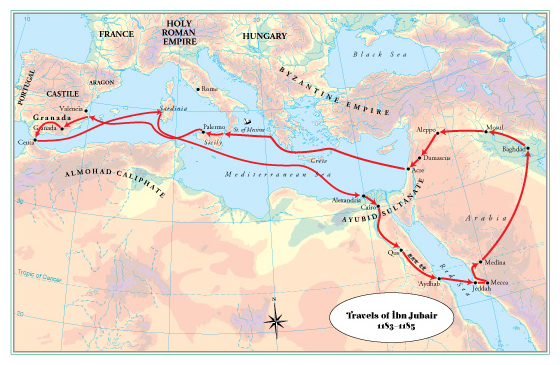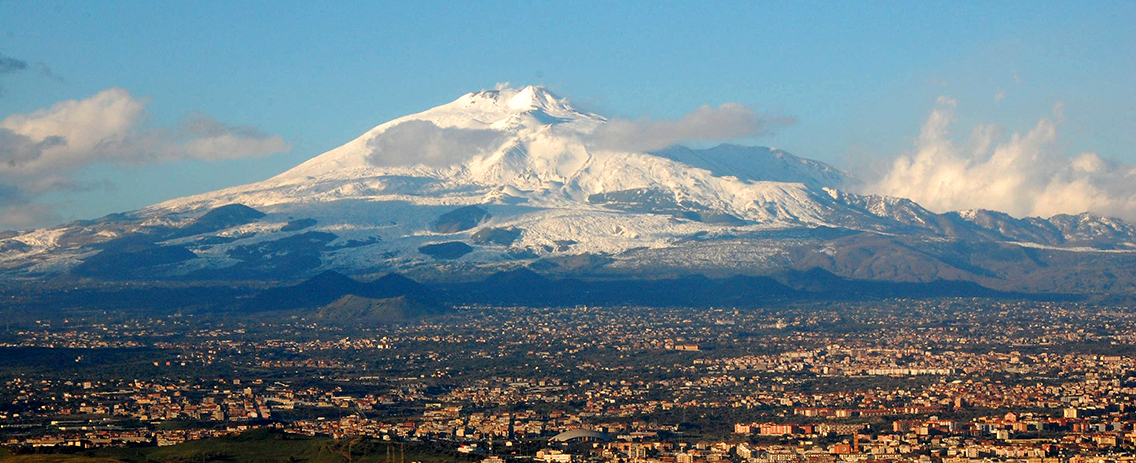By Islam Elshazly
A week ago–and 823 years in the past– the father of the travelogue genre set out on a two year trip that saw him and a friend travel thousands of miles from Granada and back again, this is a glimpse into that journey and the character of the man from whom countless travellers after him based their writings upon his own. There are thousands of travel blogs and modern travellers on the internet today, many of which – including myself – owe him a debt of gratitude, even if some of us have never heard of him before. Personally, I have done some travelling in the past, while the inclination to write about them never occurred to me at the time, the experience it left me with was — and still is — priceless. The genre of travel writing or the travelogue was born on board a ship in the year 1183 CE, Friday 25 February 1183 CE to be precise (30 Shawwal, 578 AH), at the hands of Ibn Jubayr, on his way on a trip that would take him two years around the same time as one of the most dangerous times in history, the build up to Third Crusade.Abul-Hassan Muhammad Ibn Ahmad Ibn Jubayr Al-Kinanei the Anadalusian was born in Valencia in the year 540 AH (1145 CE), his great grandfather Abdul-Salaam Ibn Jubayr was part of the vanguard that entered Granada in the year 123 AH (740/741 CE), from there the family settled in Valencia. In his chronicles of Granada, al-Ihata fi akhbar Gharnata (The Complete Source on the History of Granada), Ibn al-Khatib describes him with great reverence and admiration:
كان أديباً بارعاً، شاعراً مجيداً، سنياً فاضلاً، نزيه المهمة، سري النفس، كريم الأخلاق، أنيق الطريقة في الخط. كتب بسبتة عن أبي سعيد عثمان ابن عبد المؤمن، وبغرناطة عن غيره من ذوي قرابته، وله فيهم أمداح كثيرة. ثم نزع عن ذلك، وتوجه إلى المشرق، وجرت بينه وبين طايفة من أدباء عصره، مخاطبات ظهرت فيها براعته وإجادته. ونظمه فايق، ونثره بديع. وكلامه المرسل، سهل حسن، وأغراضه جليلة، ومحاسنه ضخمة، وذكره شهير، ورحلته نسيجة وحدها، طارت كل مطار، رحمه الله.
“He was a brilliant man of letters, a glorious poet, a virtuous Sunni, honest of work, of excellent character and gracious manners, with elegant handwriting. He studied in Ceuta under the tutelage of Abu Said Uthman Ibn Abdul-Mo’men, and in Granada under many others from his relatives, for whom he wrote many poems in their extollment. He then went to the Orient, and along the way many debates and correspondences took place between him and a few authors of his time, correspondences which featured his proficiency and fluency. His composition is superior and his prose is exquisite. His flowing words are pleasing and easy to understand; his exigencies are grand, his qualities are prodigious, famed around the world; and his And his sender, plain good, and purposes of the great, huge advantages, and mentioned a famous, and his journey took on a life of its own and reached far and wide, may Allah have mercy on him.”
Couldn’t have said it better!
The Travels of Ibn Jubayr
Every good story has a beginning, and here’s how this one begins: Ibn Jubayr worked as a secretary at the court of of the Granada’s governor, Abu Said Osman, he was coerced into drinking seven cups of wine, a drink that is forbidden in Islam. The governors way of redeeming himself was to offer him seven gold dinars, our traveller took the dinars as his cue to leave life at the courts of princes, and to expiate himself set out to perform pilgrimage to Mecca citing the Hajj and its rituals as “something of the sublime” for Muslims; setting the undertone for his observations and writings that will come in later. Faith.

From Granada and back again: Ibn Jubayr’s first travels from 1183-1185CE. Adapted from the HISTORICAL ATLAS OF THE ISLAMIC WORLD with the route itself corrected as per Ibn Jubayr’s own accounts and more than a nod to the Ibn Jubayr project: http://ibnjubayr.lib.virginia.edu/
He set out from his home in Granada, along with his friend and travel companion Ahmad Ibn Hassan, in the first hour of Thursday the 8th of Shawwal, 578 AH (February 3, 1183 CE). Their first stop was at Jaén, where they stayed for about 11 days conducting some business, leaving again on the 14th of February, passing through the forts and towns of Cabra and Écija, moving south through Osuna, Arcos and Medina-Sidonia, reaching the island of Tarifa on the 26th of Shawwal, and from there to Ceuta and the open sea beyond.

Ibn Jubayr described Mount Etna as they saw it from their ship passing close to Sicily. “Mt Etna and Catania” by BenAveling – Own work. Licensed under GFDL via Wikimedia Commons – https://commons.wikimedia.org/wiki/File:Mt_Etna_and_Catania1.jpg#mediaviewer/File:Mt_Etna_and_Catania1.jpg
All in all, Ibn Jubayr’s journey took two years and two months, him and his friend returned safely to Granada on the 22nd of Muharram, 581 AH (April 25, 1185 CE), and not too long after that, he sat down and gave us the very first travelogue in the history of travel writing. A book that “made a considerable impact on literary history. His account of his travels and tribulations in the East—which makes no mention of the wine incident—served as the foundational work of a new genre of writing, the rihla, or the creative travelogue: a mix of personal narrative, description, opinion and anecdote. In following centuries, countless people emulated and even plagiarized him.” [Source: Saudi Aramco]
He didn’t just write a clinical geographical book about the places he visited, he recorded his own personal experiences and observations of the people he met, the places he visited or passed through, the politics of the time, even the details of the different weather phenomenon and storms that seemed to have plagued them throughout the sea voyage, spiced with his anecdotes, poetry and Quranic verses here and there. It provides a first hand account of what the Mediterranean region was at the time, something that still sheds light on our current affairs, many of which seem to eerily mirror some of the events of a very muddled part of human history.
Ibn Jubayr performed two more pilgrimages, his second came upon hearing the news of Salah El-Din’s reconquest of Al-Quds (Jerusalem), and the third after the death of his beloved wife. He ended up back in Alexandria where he stayed until his death on the 30th of Shaaban, 614 AH (November 30, 1217 CE), (رحمه الله). He never recorded his last voyages.
Fore more about Ibn Jubayr you can visit:
The outstanding and thorough interactive exibition by the Library of the University of Virginia: The Ibn Jubayr Exhibition
The Travel Writer Ibn Jubayr by Daniel Grammatico, Louis Werner with art by Belén Esturla; Saudi Aramco
The travels of Ibn Jubayr in E-book format (Arabic) at e-Shamela
Tags: Aythab, Cabra, Ceuta, Egypt, Etna, Explorers, Granada, Heritage, History, Ibn Jubayr, Sicily, Travelogue







